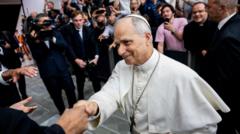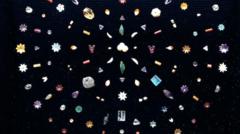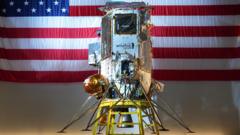A new online writing course featuring an avatar of the late Agatha Christie has sparked debates around the use of AI in education and the literary world.
**Agatha Christie Reimagined: AI Brings the Iconic Novelist Back to the Classroom**

**Agatha Christie Reimagined: AI Brings the Iconic Novelist Back to the Classroom**
An AI-generated avatar of Agatha Christie starts teaching a writing course online, stirring discussions about ethics in technology and creativity.
In a surprising twist of fate, renowned British novelist Agatha Christie has returned to teach aspiring writers despite having passed away in 1976. This innovative initiative, aptly titled "Writing with Agatha Christie," has been developed by BBC Maestro, similar to the Master Class format, allowing anyone willing to invest £79 (approximately $105) to learn from a digital recreation of the literary legend.
Employing advanced artificial intelligence technology and archival footage of actress Vivien Keene, the course features an avatar of Christie that engages students in her unique storytelling techniques. "I must confess that this is all rather new to me," the avatar quips, setting a whimsical tone for the lessons that follow.
Michael Levine, the chief executive of BBC Maestro, emphasizes that this course does not claim to resurrect Christie as a person but rather offers a means to access her expertise through a carefully constructed representation. The creative team behind the project spent considerable time researching Christie's work and interviews to curate a meaningful learning experience.
As the course rolled out, it coincided with ongoing dialogues surrounding the ethical considerations of artificial intelligence, particularly in the arts. In the UK, there have been concerns regarding a potential change in copyright laws that could allow creative works to be used in AI training without proper consent. However, in this case, Christie's estate has given its full support, ensuring that the course complies with her literary voice and style.
James Prichard, Christie's great-grandson and current head of Agatha Christie Ltd., notes that the family's involvement was crucial, stating, "We just had the red line that it had to be her words. The image and the voice had to be like her," adding a layer of authenticity to the digital project.
As more authors and creators explore the blend of AI technology and creativity, the implications of Christie's digital avatar may serve as a test case for the future of literary education and the artistic expression.
Employing advanced artificial intelligence technology and archival footage of actress Vivien Keene, the course features an avatar of Christie that engages students in her unique storytelling techniques. "I must confess that this is all rather new to me," the avatar quips, setting a whimsical tone for the lessons that follow.
Michael Levine, the chief executive of BBC Maestro, emphasizes that this course does not claim to resurrect Christie as a person but rather offers a means to access her expertise through a carefully constructed representation. The creative team behind the project spent considerable time researching Christie's work and interviews to curate a meaningful learning experience.
As the course rolled out, it coincided with ongoing dialogues surrounding the ethical considerations of artificial intelligence, particularly in the arts. In the UK, there have been concerns regarding a potential change in copyright laws that could allow creative works to be used in AI training without proper consent. However, in this case, Christie's estate has given its full support, ensuring that the course complies with her literary voice and style.
James Prichard, Christie's great-grandson and current head of Agatha Christie Ltd., notes that the family's involvement was crucial, stating, "We just had the red line that it had to be her words. The image and the voice had to be like her," adding a layer of authenticity to the digital project.
As more authors and creators explore the blend of AI technology and creativity, the implications of Christie's digital avatar may serve as a test case for the future of literary education and the artistic expression.





















